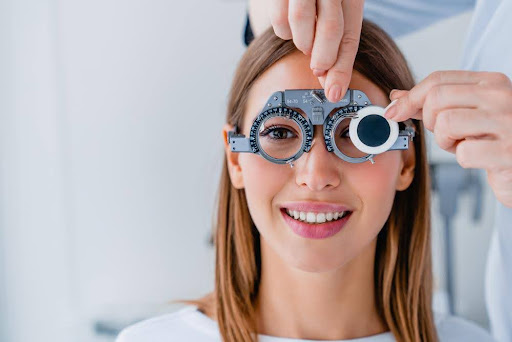It appears to be a thrilling thought that maybe the line of sight that you thought was only to the soul starts to indicate some health complications. What if, in the future, an eye examination must involve a fuller examination of the body than just providing numbers on “Spherical: -5.00,” “Cylinder: -3.00,” “Axis: 180,” and “Add: +2.25”? So these questions are not speculative but are real issues to be tackled. And that’s what we’re going to explore-the really crucial insights one can learn about general health through regular eye evaluation.
Eye examinations are just routine typical tests that most of us are used to for sight correction purposes, and thank goodness for these; they may indicate other potentially dangerous states of health! Very often, these tests give warning signs of some diseases and conditions-hypertension/ high blood pressure, diabetes, tumors, and neurological diseases like Alzheimer’s or Multiple Sclerosis. Today we will explore further by extending the understanding of general health through the narrowed lens of eye practice.
The Unseen Link: Eye Health and Overall Wellness
The eyes, what differentiates them from the other, vast world of medicine? How are they the window to our general health? Eyes are the window on health, primarily for the reason that they are the only gateway in which a physician can look into the blood vessels, nerves, and connective tissues in the body without any procedure. The view into this crane into the inner workings of the system is impertinent to the health of the eyes.
Secondly, a significant number of systemic diseases like diabetes, hypertention, and autoimmune disorders lead to changes detected early in the eyes before manifesting in other parts of the body. Neurological symptoms are quite frequently the first to be neglected initially in the eye, vis-à-vis milder visual deficits in neurodegenerative diseases.
Yet, in some eye diseases, of course, it—they themselves are predisposing factors for systemic diseases; for example, age-related macular degeneration (AMD) is an independent risk factor for stroke and cardiovascular diseases.
What Eye Test Can Detect Beyond Vision
So, now we step into the territories of witness. Eye test harness the technology to show us another world. As diagnostic tools, eye tests are an early beacon of health. A detectable change in the retina signifies diabetic retinopathy and could tell us that diabetes is setting in before any other symptoms appear. It also is a dead giveaway of hypertension: if you see a sudden change in the retinal vessels, you know where the nature of eye pressure is from.
Optic nerve changes may hint at autoimmune disorders like Multiple Sclerosis. In Alzheimer’s Disease, some imaging techniques show characteristic changes within the retinal nerve fibres and depositing of specific proteins. Glaucoma, an eye condition often related to increased eye pressure, is often the harbinger of an underlying cardiovascular condition.
The Power and Limitations of Eye Test
Eye test can offer a variety of data and information on the maintenance of life and health; however, it is important to always bear in mind that they are never a replacement for a complete body examination. They may show some early changes in the eyes, thereby also making early intervention possible when impending diseases appear at this stage.
However, the final diagnosis is that systemic diseases can’t be auto-concluded by the eyes; the validation of the eye-testing outcome then will be through more specific investigations.
The Right Time: When Should You Get Tested?
Each person has a right time to get tested. It depends on the age, family history, lifestyle habits and health status of a person in question. However, it is of utmost importance to get regular testing or screening for the eyes-at least once in two years for a normal, healthy adult or patient.
For important signs and symptoms of the diseases mentioned above, the eyes should be checked more frequently in a family history of such conditions as diabetes, hypertension, etc.
Consequence of Ignorance: Risks of Not Getting Regular Eye Examinations
A neglect for eye health has serious consequences – Something that risks your vision also constitutes missing on diagnosing your health condition. Early diagnosis occurs when individuals are lucky, with every opportunity to get better, get good care, and get out of the mess. There can never be a better reason for principle, other than the health benefits. Hence, regular periodic tests are ruled out in advance.
Conclusion
A concluding remark: Assaying for eye health is all but a miniature representation of our overall well-being. At the core of all of this, however limited in scope it may appear, the observation from the eyes would certainly sound the siren for many other life-threatening diseases.
Therefore, the next time you visit your ophthalmologist, remember that they are not merely checking whether you can read the bottom line on the eye-cchart. Their purpose stretches out to unfolding the baggage of hidden health in those eyes. The eye test must no longer be seen as a tool to test sight, but instead as a mini health checking that can provide us with the most valuable information about our general health and well-being.



